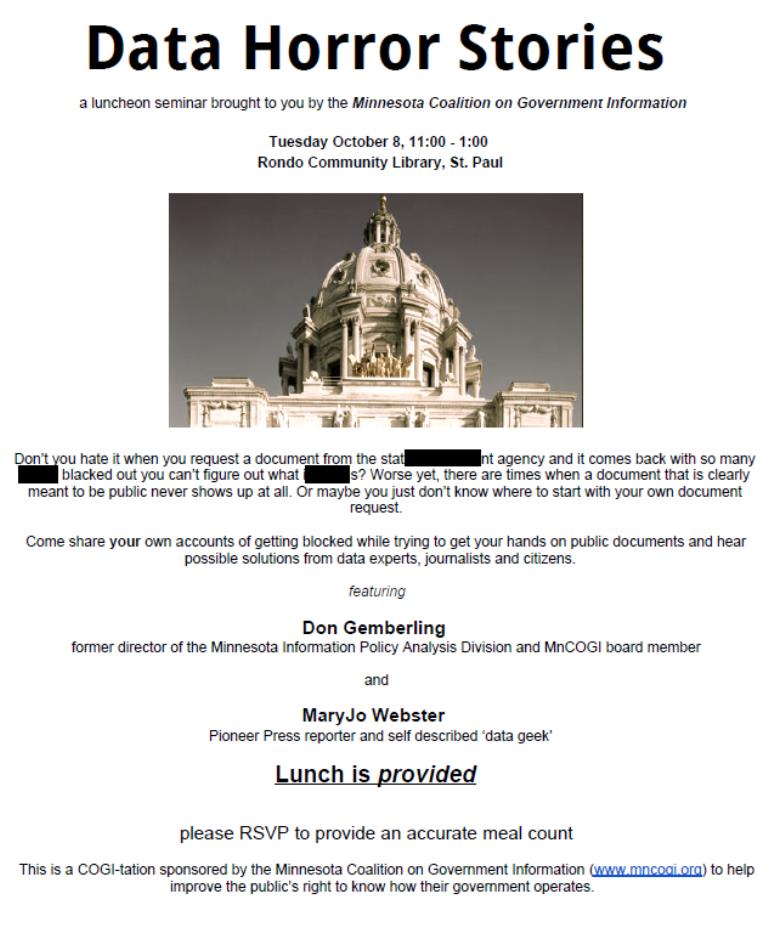Slots are limited, so sign up here: http://www.www.eventbrite.com/event/1227871597
IPAD’s message to the Star Tribune: We help keep government open
From James Eli Shiffer, MNCOGI board member and the Star Tribune’s watchdog and data editor
This week, two dozen Star Tribune journalists launched polite questions at Stacie Christensen and Janet Hey of the Information Policy Analysis Division (IPAD), the state agency that weighs in on conflicts over public records and open meetings. I invited them to visit the Strib after hearing they had done a similar presentation to Minnesota Public Radio. They’ve also visited the Pioneer Press, and after their visit to the Star Tribune, most of us came away convinced that Stacie and Janet are committed to helping journalists and the public keep government open.
The last state in which I practiced journalism, North Carolina, didn’t have anything like IPAD, so I didn’t know at first whether they were friend or foe in getting government officials to obey the law. Here’s what I took away from their presentation on the Minnesota Government Data Practices Act:
Presumption of openness: The MGDPA has a presumption that all records are public, except in two areas: personnel records and police records. For those categories, records are non-public unless specified.
Access to records: Government agencies must allow free inspection of public records, no matter what form they’re in. Anyone requesting public records doesn’t have to say who they are or why they want the records.
Proprietary data: There’s no such designation in the MGDPA, so if any agency or contractor invokes that phrase to try to withhold records, it’s bogus.
Incentives: One explanation for officials’ reluctance to release records is that there are more penalties for releasing private data than there are for withholding public data.
Records retention policy: Ask for it! Every agency has to have one. And it’s illegal for an agency to destroy a public record after someone has requested it, even if the retention policy allows them to do it.
Call them: IPAD staff are willing to mediate disputes over records, and sometimes even participate in conference calls to advise government agencies and records requesters about what the law requires. You can reach IPAD at Phone: 651-296-6733 or 800-657-3721 or info.ipad@state.mn.us
Reporter fights back, with words, after getting stonewalled over records
Last week, my Strib colleague Chao Xiong couldn’t get the Ramsey County Sheriff’s Office to hand over public records regarding a homicide. So he blogged about the experience, and got a promise from the sheriff to do better next time. Read his story here.
— James Eli Shiffer, MNCOGI board member and the Star Tribune’s watchdog and data editor
MNSure records to remain public
The Minnesota Department of Administration recently determined that “marketing data” held by MNSure, the state’s health care exchange, must remain open to review by the public.
In July, MNSure, submitted a request to the department for a temporary data classification that would have converted internal marketing documents to a “nonpublic” status until its marketing plans were publicly released. The change would have closed off access to scores of documents that were presumed to be public, due to MNSure’s status as a taxpayer supported entity.
MNCOGI submitted comments in opposition to MNSure’s application, and noted that MNSure had not met the showing required by Minnesota law to get the data re-classified. On August 22, Commissioner Spencer Cronk agreed with MNCOGI and others, and determined that MNSure’s marketing records must continue to be publicly available.
Lifting the veil on sudden departures by government officials
By James Eli Shiffer, the Star Tribune’s watchdog and data editor, and brand-new COGI board member
Nine months after he arrived to run a 300-employee department for the city of Minneapolis, Gregory Stubbs abruptly quit. The City Council gave him $65,000 and gave the public no explanation.
The Star Tribune reporters who cover Minneapolis thought they had an easy way to find out why Stubbs left. They sent a public records request to the city invoking a new provision of the Data Practices Act designed to shed light on the departure of “public officials” who leave in the midst of scandal. The law had been changed following outrage over the pricy and unexplained severance package given to a school official in Burnsville.
But the city of Minneapolis had a surprising response: the city’s director of regulatory services isn’t a public official, as defined by the law. The Star Tribune went to IPAD for an opinion, and the agency agreed with the city. As it turns out, the law was drafted in such a way that it excluded most of Minneapolis’ top officials, including the police and fire chiefs. Reporter Eric Roper turned that situation to his advantage, writing a story about the loophole and getting a key lawmaker on the record that it would be changed.
The Legislature followed through this year by broadening the definition of “public official” to eliminate any doubt that it covered Minnesota’s largest city. In an era when lawmakers are making more and more exemptions to the Data Practices Act, this was one significant advance for the public’s right to know.
It took weeks before the Stubbs documents arrived at the Star Tribune. They were heavily redacted, but they documented the sex discrimination and ethics complaints that preceded Stubbs’ departure. On Aug. 23, nearly a year after we first asked for the records, the Star Tribune published the story on the metro cover.
I learned several lessons from this journey: Read the law. Hold lawmakers accountable for their pledge of openness. Keep up the pressure on governments to release records. And when you get the records, publish a story. It lets everybody know we mean business.
The National Freedom of Information Coalition 2013 Summit: Get Involved in the Legislative Process
I attended the National Freedom of Information Coalition 2013 FOI Summit in New Orleans last month. The NFOIC has posted a wrap-up page with videos of the Saturday panels and the keynote address.
In addition to the presentations on Saturday, panels on Friday afternoon brought together the attendees to talk about nuts-and-bolts issues of running a state freedom of information group, like fund-raising and maintaining a website. The conversation was informal and part of the aim was to share news of activities in the states.
In the session titled “Yes, You CAN … on a Shoestring,” the speakers were ardent advocates for getting involved in the legislative process. Across the country there are a few states that hire and pay lobbyists. Many other states are in a situation similar to Minnesota, where the group is a 501c3 educational group and “lobbying” is only done informally and without pay by members of the groups. The comments were valuable for both types of situations.
 Megan Rhyne, the Executive Director of the Virginia Coalition for Open Government, said that if you want to lobby, you should and you can. The benefits are so much greater than the time you spend in the chambers. Since the VA Legislature meets only two months each year, most lobbying is done during the interim. During the session, she makes almost daily trips to walk the halls, meet with legislators, and attend committee hearings to testify or watch. Some of her most useful conversations and contacts over the years have taken place when she didn’t expect it – in a bathroom washing her hands, or while chatting with lobbyists of other groups that may have similar interests. Half of lobbying is just showing up. You are not only talking with legislators, but also meeting other stakeholders. Lobbying gives your group a good public relations platform to reach out to donors and constituents. With information from the capitol you have instant content for your social media outlets. It gives you a way to get your members involved; you can inform members about what they can do about various issues and bills, and who they should contact.
Megan Rhyne, the Executive Director of the Virginia Coalition for Open Government, said that if you want to lobby, you should and you can. The benefits are so much greater than the time you spend in the chambers. Since the VA Legislature meets only two months each year, most lobbying is done during the interim. During the session, she makes almost daily trips to walk the halls, meet with legislators, and attend committee hearings to testify or watch. Some of her most useful conversations and contacts over the years have taken place when she didn’t expect it – in a bathroom washing her hands, or while chatting with lobbyists of other groups that may have similar interests. Half of lobbying is just showing up. You are not only talking with legislators, but also meeting other stakeholders. Lobbying gives your group a good public relations platform to reach out to donors and constituents. With information from the capitol you have instant content for your social media outlets. It gives you a way to get your members involved; you can inform members about what they can do about various issues and bills, and who they should contact.
Lobbying doesn’t always change the outcome of legislation, but sometimes it does. For many bills, it is helpful to identify citizens who can testify.
Sometimes coalitions can be pigeonholed as just spokespeople for open media issues and for the concerns of journalists – but the coalitions represent more, they represent open government for all citizens. You are an embodiment of the peoples’ right to know. Keeping close contact with the media is useful; journalists like to write articles about bills that will affect them directly, and they will be looking for spokespeople.
 Hyde Post, a journalist and consultant from Georgia, said that their group looks at education as a form of long-term lobbying. Lobbying at the legislature is a form of triage. Often you are working to prevent the doors of open government from being shut. How do you prevent that? Build a basic education workshop that you can transport anywhere. Make it your business to get in front of newly-elected or newly-appointed public officials, like state court judges, or school board members, or sheriffs, even legislators School board officials are often those least-savvy about public openness issues, he noted, since many come from the private sector. If you make contacts with people at an educational seminar and they see you at the Capitol some time later, they will know you, before there is a crisis with a specific bill and you are heading off legislation at the pass.
Hyde Post, a journalist and consultant from Georgia, said that their group looks at education as a form of long-term lobbying. Lobbying at the legislature is a form of triage. Often you are working to prevent the doors of open government from being shut. How do you prevent that? Build a basic education workshop that you can transport anywhere. Make it your business to get in front of newly-elected or newly-appointed public officials, like state court judges, or school board members, or sheriffs, even legislators School board officials are often those least-savvy about public openness issues, he noted, since many come from the private sector. If you make contacts with people at an educational seminar and they see you at the Capitol some time later, they will know you, before there is a crisis with a specific bill and you are heading off legislation at the pass.
This is just a small piece of the interesting session. Another important topic was fund-raising, a crucial aspect of the life of any small nonprofit. Hyde Post from Georgia said that their group began as an organization with $15,000 a year and has grown from there. “We are always on the precipice of running out of money. If you aren’t worrying about money all the time, I want to meet you, because you probably have a lot of it and I’d like some.” He also pulled out his phone from his pocket and the small credit card reader that hooks onto it. He said that everyone in the room needed one. That way if you are talking with anyone who might have an interest in donating to your group, you are ready to take a donation, then and there.
The Summit was well-run, the speakers were engaging, and my overall reaction was regret that I had not attended the summits in previous years!
Robbie LaFleur
Note to Self: Don’t Get Arrested

Overloaded with too many print and online news sources already, I never pick up something to read at my local convenience store. Maybe that’s why I haven’t kept up with Busted Paper, a newspaper that publishes mugshots from Hennepin, Ramsey, Anoka, and Dakota counties. Stephanie Fox from the Twin Cities Daily Planet wrote a great article about the issues raised by the Minnesota paper and similar newspapers and websites around the country. Read “Busted Paper” and other mugshot magazines: Why they are—and will likely remain—legal.
MNCOGI board member Jane Kirtley was quoted in the article.
Mugshots.com includes on its website more than 11,000 words justifying why what they do is moral and legitimate, including strong legal and social arguments about legitimate public interest, open government, even tough love. A lot of people in law and the media agree.
“Many in the criminal justice system are appalled by public access to mugshots in papers and online,” said Jane Kirtley, Silha Professor of Media Ethics and Law at the School of Journalism and Mass Communications at the University of Minnesota.
“Their reaction is to say that it’s an invasion of privacy, there are unintended consequences, that it inflames the public. A lot of the members of the public are appalled, too. People forget that transparency in the criminal justice system is for the protection of the arrested. Secrecy imperils those in custody,” she says. “Public information should be accessible and there should always be a presumption of openness.”
The attitude is similar at the Minnesota ACLU, where executive Director Chuck Samuelson agreed that openness in the criminal justice system is vital for a free society.
“One of the things we had our revolution about in 1776 was secret police work by the government. That’s why we have the Fourth Amendment. Arrests must be public. If they are public, there must be a record of it and the government has to bring you into open court.”
“That’s the good side,” he said. “You don’t want situation like in Argentina. But the bad news is if it’s all public, so is your mugshot.”
Good arguments. I hope to avoid being arrested, so I can stay out of the Busted Paper and don’t have to pay money to get my image off websites like mugshots.com.
— Robbie LaFleur
A Great Keynote at the 2013 Freedom of Information Day Event – Some Notes
Judge Kathleen Gearin gave a robust argument for allowing the televising of court proceedings in civil and criminal cases in Minnesota, a position developed over the past ten years. She said her personal experience with cameras in her courtroom has been only positive. For example, the televised hearings during the 2011 state government shutdown helped the public understand the process.
She noted many reasons that judges and lawyers oppose opening up courtrooms to televised coverage. Judges are afraid of the unknown, and many are uncomfortable with public speaking. They are afraid that single sentences may be broadcast out-of-context, that cameras will bring more publicity to cases, and that it will be more difficult for juries. Judges and attorneys will play to the cameras. Witnesses don’t want to be seen as snitches. Minnesota has a collegial bench, and some judges don’t want to be considered oddballs, or “hot dogs.”
To counter those arguments, Judge Gearin said that in practice judges quickly forget that the camera is even there, and the media have been respectful of the privacy of juries and witnesses. During the question and answer period someone asked whether there is a particular state that allows cameras in the courtroom that would be a good model for Minnesota. Her matter-of-fact response was that all the states allowing cameras in the courtroom are fine models.
Judge Gearin feels that a successful move to full use of cameras in the courtroom in civil and criminal cases will require broad acceptance in the legal community, and that the legal culture in Minnesota is slowly changing.
I recommend watching all of Judge Gearin’s interesting and thoughtful remarks, available here.
Robbie LaFleur
Pictures and Video from the 2013 Finnegan Award
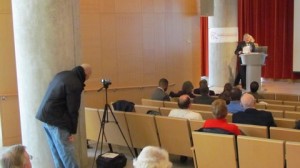
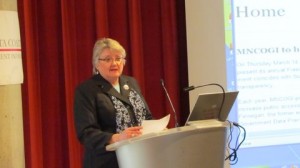
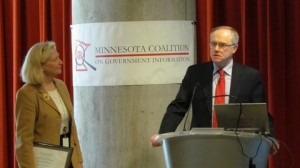
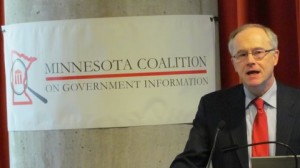
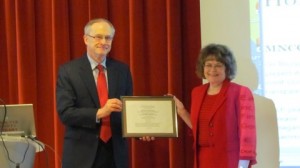
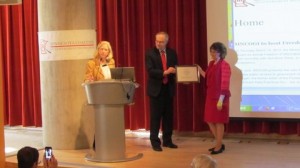
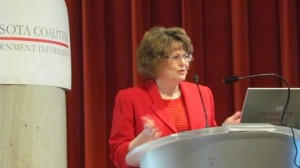
—
Video from The UpTake
Updates on MNCOGI legislative activity
HF 5 – Health care exchange bill. MNCOGI testified about the bill’s data provisions, as did many others. The House version of the bill (which passed on March 4th) had been altered to make its meeting provisions more closely conform to the Open Meeting law. Language regarding data sharing with the federal government had also been somewhat tightened over the initial version of the bill. The Senate version of the bill does not currently contain these modifications and improvements.
HF 20/SF 60 – Bills exempting certain personal e-mails from disclosure under the Data Practices Act. MNCOGI offered testimony about both bills, advocating for a public classification for such e-mail data. Neither the House or Senate has voted on either bill as of yet.
SF 385 – License Plate Reader (LPR) data classification. MNCOGI testified at a hearing on the Senate version of the bill. On Feb 28, amendments were offered to allow LPR data to be retained and classified as “not public” for 45 days. The original language of the Senate bill would have required the destruction of much “non-hit” LPR data upon acquisition. At present, the House has not heard testimony on the companion bill.

